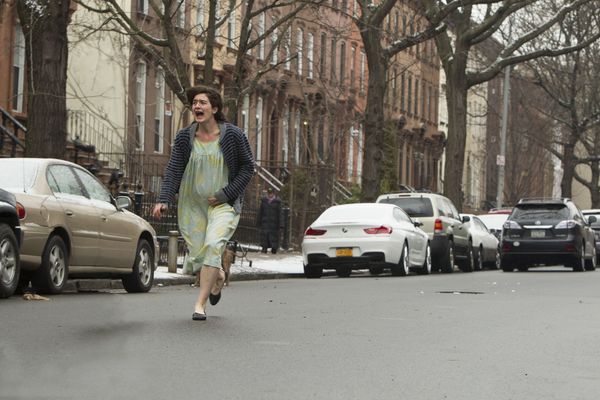Eye For Film >> Movies >> Lyle (2014) Film Review
Lyle
Reviewed by: Jennie Kermode

Leah (Gaby Hoffmann) is a young mother with another one on the way, moving into a new apartment with her partner June (Ingrid Jungermann) as June prepares to clinch a new deal at her recording studio. From the outset Leah is ill at ease, made more so by the ageing landlady (Rebecca Street) announcing that she is trying for a baby, but this seems like the usual stress that most stay-at-home parents of toddlers experience. When tragedy strikes, however, Leah's sense of persecution begins to spiral out of control. Of course, that doesn't mean that nobody is out to get her.
It won't take viewers long to notice that this film owes a lot to Rosemary's Baby, and to say that it doesn't live up to that standard is scarcely to diminish it. There are structural problems here, plus unnecessary heavy-handedness and cheesiness toward the end, but it's carried throughout by a strong performance from Hoffmann and Street provides able support, whilst the subplot around her provides welcome complexity and gives the story some humanity. The predominantly white colour palette effectively conjures up the sense of isolation many women in Leah's position feel at the same time as evoking the sanitised atmosphere of a psychiatric institute.

Where the film comes closest to the Polanski classic, it's interesting to note the narrative differences. Leah is assured that taking psychiatric medication wouldn't harm the baby, but her deferral is accepted. She's given water instead of wine. When things go wrong at party, nobody suggests that she lie down. She is expected to be responsible for herself in a way that Mia Farrow's character was not; it's an altered view of pregnancy, and of womanhood, that makes her differently vulnerable. The almost complete removal of men from the story means that the experience of these things loses its exoticness; pregnancy is just a fact of life and Leah takes the physical changes she's going through completely in her stride. She also retains a healthy sexual appetite, become increasingly fascinated by the model who lives upstairs; on one level, this is simply a driver for the plot, but on another it helps to present her as a rounded, whole person, throwing her obsessive thoughts into sharp relief.
Though the film could be criticised for being too linear (and sometimes too obvious) there is an attempt to add thematic depth which suggests director Thorndike will produce some interesting work in the future. Leah lingers near a window that always seems replete with temptation. Shots of the building, of its central staircase, and photographs Leah finds always direct the gaze upwards. Almost everyone Leah meets seems to be ambitious, but all she wants is her daughter, Lyle.
Competently played all round and with some effective stylistic elements, this is a film that could do with a bit more ambition of its own but that still handles itself well enough, and very impressively indeed for something shot in mere days.
Reviewed on: 02 Aug 2014















